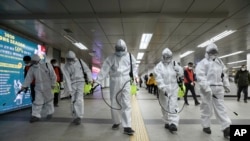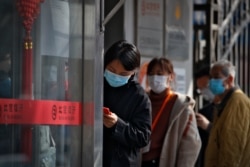The World Health Organization Wednesday declared the coronavirus outbreak a pandemic, with 14 countries confirming cases.
“In the past two weeks, the number of cases of COVID-19 outside China has increased 13-fold, and the number of affected countries has tripled,” WHO chief Tedros Adhanom Ghebreyesus said Wednesday.
Tedros warned that the worst is yet to come with the WHO “deeply concerned both by the alarming levels of spread and severity, and by the alarming levels of inaction.
“In the days and weeks ahead, we expect to see the number of COVID-19 cases, the number of deaths, and the number of affected countries to climb even higher,” he said.
Tedros said his organization has “rung the alarm bell loud and clear,” and that countries “can still change the course of this pandemic.”
U.S. President Donald Trump addressed the nation from the Oval Office Wednesday, declaring “the virus will not have a chance against us,” announcing a 30-day suspension of all travel from Europe to the United States, starting Friday. Travel from the United Kingdom is exempt.
Trump also announced financial relief for people and businesses affected by the virus.
There are more than 1,100 confirmed cases in the U.S. When there were just 15 cases last month, Trump said that number would soon drop to zero. It has since spread to about 40 of the 50 U.S. states. Thirty-eight people have died.
“Bottom line, it’s going to get worse,” the head of the National Institute of Allergy and Infectious Diseases, Anthony Fauci, said Wednesday.
Fauci says how much worse depends on the U.S. government’s ability to control the number of travelers coming into the U.S. and local efforts to contain the virus.
Canadian Prime Minister Justin Trudeau announced a $728 million package to fight the virus, much of which will be used to develop a vaccine.
Some European nations are taking more draconian steps. Italy, Europe’s hardest-hit country, is under a nationwide lockdown. The few who are outside describe the empty streets, abandoned sidewalk cafes, boarded-up restaurants, and tourist attractions as spooky.
All museums and schools in Spain are closed. Denmark has also shuttered schools and Britain announced a multibillion-dollar package to boost the country’s health care system and to also help businesses taking an economic hit.
Festivals and any kind of event that attracts large crowds and brings people close together have been canceled across much of Europe.
Conditions have improved in China, where the outbreak began in December, but authorities are worried about a resurgence. Beijing’s city government says all visitors from overseas will be quarantined for 14 days.
US outbreak pockets
In the United States, March usually means one of sports’ biggest events, the college basketball tournament dubbed “March Madness.”
The National Collegiate Athletic Association says this year’s tournament will be played without fans, a decision that is certain to dampen the excitement of games, where crowds play a huge part.
The National Basketball Association announced late Wednesday it is suspending the rest of the 2020 season after a player for the Utah Jazz tested positive for coronavirus.
Basketball’s Golden State Warriors will also play in an empty arena after authorities in San Francisco banned gatherings of more than 1,000 people.
Finally, Major League Baseball’s Seattle Mariners team has canceled all home games in March. Washington state Governor Jay Inslee declared a public health emergency in the state.
As of late Wednesday, there were more than 126,000 coronavirus cases in 114 countries and more than 4,600 deaths.









